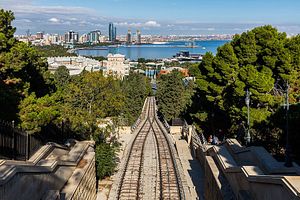On February 6, the Azerbaijan-China Business forum held in Beijing gathered together a number of state officials including Minister of Economy Shahin Mustafayev, the Chairman of the Export and Investment Promotion Fund of Azerbaijan (AZPROMO), as well as officials from the Ministry of Commerce of China and the Chinese Council of Propaganda of International Trade. The business forum was reportedly devoted to the Trans-Caspian Transit Corridor as part of China-led ambitious Belt and Road Initiative.
The Trans-Caspian International Transport Route, a corridor of 6,500 km links Asia with Europe and passes through countries including Azerbaijan, Georgia, Kazakhstan, and Turkey. A flagship project of the corridor, the Baku-Tbilisi-Kars (BTK) Railway, was inaugurated in October in 2017. The railway connects Azerbaijan, Georgia, and Turkey, establishing a freight and passenger link between Europe and China. During the inauguration ceremony President Ilham Aliyev stated that “Baku-Tbilisi-Kars will connect not only countries, but continents as well.” Thus, the BTK project is undoubtedly has enormous importance to the competitiveness of the Trans-Caspian corridor.
The China-Europe freight train from China’s Urumqi to Europe running through this line began operations in January. The corridor will cut the transportation time of freight and goods from about 60 days by sea to about 14 days by train, and decrease the cost four times compared with air. Thus, the corridor offers a more convenient and a more economical alternative to transmit goods from Asia to Europe and the other way round, according to Shahin Mustafayev.
Azerbaijan strives to shift the dynamics of global transit by investing heavily in the transportation field, in particular international highways, railways, and sea-port projects. In this respect, China and Kazakhstan value the participation of Azerbaijan in the BRI project as a main European gateway for local goods. During the most recent World Economic Forum held in Davos, Deputy Prime Minister of Kazakhstan Yerbolat Dossayev emphasized the importance of Baku’s sea-port for landlocked Kazakhstan. In 2017, Kazakhstan set a target to export more than 450,000 tons of gas and oil using the new Kuryk port through Alyat port in Baku and Georgia before the end of the year. Officials are also discussing opportunities to transport transit cargo, such as raw sugar, to Uzbekistan before the end of 2018.
Obviously, China-led transportation projects, including the North-South and East-West corridors, are of great importance for landlocked Central Asia as well as the South Caucasus region.
“Cooperation with China in the transit sector is one of our priority areas. Using the potential of Trans-Caspian corridor creates a fertile ground for cooperation, in particular for investment, trade, and transit. In 2017, the trade turnover between Azerbaijan and China increased by 43%, amounting to $ 1.2 billion. Exports to this country grew 2.1 times,” Azerbaijan’s Mustafayev has said at the business forum in Beijing.
The factor that makes the Trans-Caspian route more attractive for potential countries is its impressive technical capabilities. With an annual capacity of 27.5m tons of containerized cargo, the TITR is projected to transport up to 300,000 TEU by 2020. Moreover, participating bodies are keen to expand the route geographically by inviting new countries. Therefore, applying competitive tariffs for cargo transportation on this corridor has been one of the main aims of participating parties.
With hundreds of millions in revenue expected to enter the country’s economy via TITR, Azerbaijan is seen as arguably the biggest beneficiary of the line. Azerbaijan Railways could gain profits worth $600-700 million from transit traffic alone by 2020, according to Akif Mustafayev, the head of local TRACECA office in Baku. In addition to Azerbaijan, Kazakhstan also has high stakes in the Trans-Caspian corridor. Since 2013, Kazakhstan has adopted a new transit policy targeting to attract eight percent of the EU-China freight traffic between now and 2020, which is equivalent to 15 million tons of cargo. With the launching of new railways and free-trade zones, Kazakhstan expects to have capacity the for 1.7 million containers annually to pass through the country between Europe and China by 2020.
The Trans-Caspian International Transit Route is set to reinvigorate regional economic growth, and to serve as a suitable gateway to Europe for China and the landlocked Central Asian region. Hence, beyond its economic value, the TITR will improve connectivity across Eurasia. Taking into account the geostrategic location of the South Caucasus and Central Asian region, China will likely expand cooperation through investing in logistics and infrastructure projects.
Fuad Shahbazov (@fuadshahbazov) is an Expert-Adviser at the Baku-based Center for Strategic Studies under the President of Azerbaijan Republic.

































